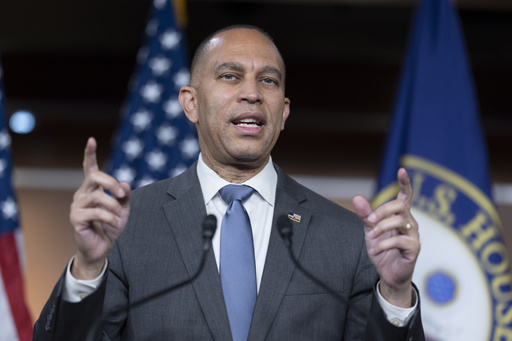WASHINGTON — Following what is considered one of the most disordered and ineffective congressional sessions in recent times, voters surprisingly leaned towards continuity in the recent elections for the U.S. House of Representatives.
House Republicans will maintain a slender majority, with the precise partisan distribution still being finalized as ballots continue to be counted in a few states. However, the results from the 435 races across the nation indicate minimal alteration in the composition of the House.
The situation appears to resemble a stalemate, with each party flipping seven more seats, while only eight incumbents have faced defeat nationwide.
The election outcomes reveal the deeply rooted nature of political dynamics in a legislative body that ideally reflects the populace’s desires. The anticipated impact of Donald Trump’s success in battleground states and the GOP’s internal strife over the past two years didn’t significantly influence the House election results. Ultimately, control over the chamber hinged on a small number of divided districts, with fewer nail-biting contests despite House candidates collectively spending around $1.5 billion, as reported by a political spending tracker.
Hakeem Jeffries, the leader of the House Democrats, expressed his disappointment regarding his party’s inability to reclaim control of the House by just a handful of seats. However, he emphasized that despite the difficult political climate associated with a Trump wave affecting battleground states, Democrats have managed to increase their seat count in the upcoming Congress.
In contrast, Republican leaders are celebrating their retention of the majority, framing it as a mandate for a conservative agenda implementation. Rep. Richard Hudson, who chairs the GOP’s House campaign committee, stated that voters made it clear on Election Day that they reject the repercussions of Democratic governance. He connected this to the election of House Republicans and Trump’s significant electoral win.
While Trump is projected to win the popular vote for the first time, it is anticipated that it will be by a narrow margin once all votes are counted, reflecting the ongoing political deadlock in the nation. In the House, the numbers are expected to remain tight, particularly after Trump appointed several House Republicans to cabinet positions.
“Every single vote will count,” remarked House Speaker Mike Johnson, highlighting how illness or travel delays could affect votes.
Johnson’s party secured their majority significantly through two seats flipped in Pennsylvania and three additional seats that benefited from gerrymandering by the GOP-controlled North Carolina General Assembly.
Democrats found success mainly in New York, Jeffries’ home state, flipping three seats, and also gained two redistricted seats in Louisiana and Alabama, which were mandated by courts to ensure equitable representation for Black voters.
However, as the congressional landscape becomes clearer following recent redistricting linked to the 2020 census, some advocates for democracy have voiced concerns regarding the limited number of competitive House districts.
Republicans had long benefitted from disproportionate congressional seats due to gerrymandered districts, while Democrats have countered by creating strategic districts, thereby leveling the playing field.
David Peters, a senior fellow at FairVote who writes on gerrymandering, asserted that this state of affairs leads to a House that barely represents the public’s sentiments. He stated that voters are left with little potential to change power dynamics in the House, even as their opinions evolve.
FairVote estimates that about 85% of House seats are now considered secure for one party, the highest level of safety recorded in twenty years. This political polarization plays a significant role in this situation, making House members less inclined to collaborate across party lines for fear of facing primary challengers who may criticize their bipartisanship.
Among the incumbents who were defeated, such as Democratic Rep. Yadira Caraveo from Colorado and Republican Rep. Marc Molinaro from New York, many had shown a willingness to engage in bipartisan efforts.
As Republicans now control the House, the Senate, and the White House, discussions of collaboration with Democrats are scarce. Instead, they are looking to use a specific budgetary procedure to push through legislation focused on extending tax cuts, strengthening immigration policies at the southern border, and reducing federal regulations.
To achieve their agenda, Republicans must also address the infighting that has plagued them for the past two years, and signs of discord are already apparent.
This week, Johnson secured the GOP’s nomination to continue as speaker when the new Congress convenes on January 3. However, lawmakers are still debating whether to maintain the rules that allowed a conservative minority to remove Johnson’s predecessor, Kevin McCarthy.
With such a slim majority, it becomes possible for nearly any Republican to hinder the progression of legislation, a tactic that the conservative faction has employed repeatedly.
“It’s going to be as difficult as ever for Congress to accomplish anything,” noted Rob Speel, a political science professor at Penn State Behrend.
This website uses cookies so that we can provide you with the best user experience possible. Cookie information is stored in your browser and performs functions such as recognising you when you return to our website and helping our team to understand which sections of the website you find most interesting and useful.
